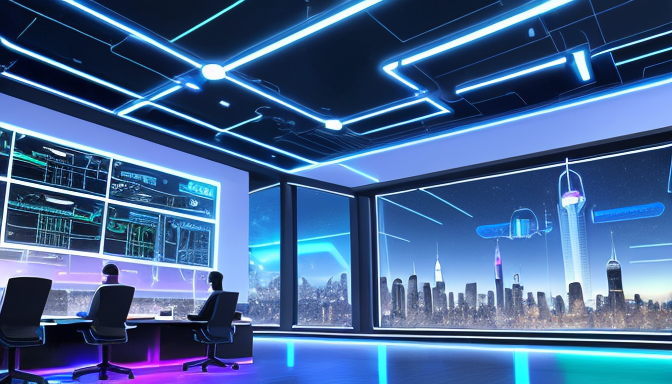In today’s fast-paced world, startups are not just small businesses; they are the trailblazers of innovation, pushing the boundaries of what’s possible in technology. These dynamic companies are rewriting the rules and redefining industries with their groundbreaking ideas. Imagine a world where your healthcare is managed by an app, or your supply chain is optimized by AI algorithms that predict demand before it even arises. That’s not just a dream; it’s happening right now!
Take, for instance, the story of XYZ Tech, a startup founded by a group of passionate engineers who believed that blockchain could revolutionize data security. Their platform not only enhances privacy but also empowers users to have full control over their personal information. This kind of innovation is what sets startups apart—they are not afraid to challenge the status quo and take risks that larger corporations often shy away from.
As we look to the future, it’s clear that these startups are shaping the tech landscape in profound ways. With emerging technologies like the Internet of Things (IoT) and artificial intelligence at their fingertips, the possibilities are endless. They are not just creating products; they are crafting experiences that resonate with users on a personal level. If you want to understand the future of tech, keep your eyes on these disruptors—they’re the ones who will lead us into a new era of innovation.
Innovative Business Models
In the ever-evolving tech landscape, innovative startups are crafting business models that challenge the status quo and captivate consumers. These companies are not just selling products; they’re creating entire ecosystems that enhance customer experiences and generate new revenue streams. Think of it like a chef who doesn’t just serve a meal but curates a dining experience that leaves diners craving more.
One standout example is the subscription model, which has transformed industries from software to food delivery. Companies like Netflix and Blue Apron have tapped into this model, offering convenience and personalization that traditional retail simply can’t match. By charging a recurring fee, these businesses ensure a steady income while keeping customers engaged with fresh content and products.
Moreover, the rise of platform-based models has enabled startups to become intermediaries, connecting buyers and sellers in new and exciting ways. Consider Airbnb and Uber; they’ve turned spare rooms and idle cars into lucrative assets for individuals, all while providing users with seamless access to services that were once difficult to obtain. This shift not only democratizes access but also empowers individuals to monetize their resources.
As we look to the future, the potential for these innovative business models to reshape industries is enormous. With every new startup that emerges, we witness a ripple effect that can lead to significant changes in how we consume and interact with technology. The question is: are you ready to embrace the future these innovators are creating?

Emerging Technologies
In today’s fast-paced world, are not just buzzwords; they are the lifeblood of innovative startups that are redefining the tech landscape. Imagine a world where artificial intelligence (AI) seamlessly integrates into our daily lives, making decisions that enhance our productivity and creativity. Startups like OpenAI and DeepMind are at the forefront of this revolution, developing AI systems that learn and adapt, transforming industries from healthcare to finance.
But it doesn’t stop there! Blockchain technology is another game-changer, providing unparalleled security and transparency. Startups such as Chainalysis and Ripple are harnessing blockchain to create decentralized systems that challenge traditional banking and finance, ensuring transactions are not only faster but also safer. This technology is like a digital fortress, protecting data from breaches and fraud.
Furthermore, the Internet of Things (IoT) is connecting devices in ways we once thought were science fiction. Companies like Nest and SmartThings are pioneering smart home technologies that allow us to control our environment with a simple tap on our smartphones. Imagine your fridge alerting you when you’re out of milk or your thermostat adjusting itself based on your daily routine—this is the future these startups are creating!
With these cutting-edge technologies reshaping our reality, the question remains: how will these innovations influence our future? The possibilities are endless, and as these startups continue to push boundaries, we can expect a tech evolution that not only changes industries but also enhances our everyday lives.
Frequently Asked Questions
- What are disruptive startups?
Disruptive startups are innovative companies that challenge traditional business models and practices, often using technology to create new markets or transform existing ones. They focus on solving problems in unique ways that can significantly alter consumer behavior and industry standards.
- How do these startups leverage emerging technologies?
Startups harness emerging technologies like AI, blockchain, and IoT to develop solutions that improve efficiency, enhance customer experiences, and create new revenue streams. By integrating these technologies, they can offer products and services that were previously unimaginable.
- Can you provide examples of industries being disrupted?
Absolutely! Industries such as finance, healthcare, and transportation are experiencing significant disruption. For instance, fintech startups are revolutionizing banking, while healthtech companies are changing how we approach medical care through telemedicine and personalized health solutions.
- What impact do these startups have on the economy?
Disruptive startups drive innovation, create jobs, and stimulate economic growth. By challenging established companies, they encourage competition, which can lead to better products and services for consumers, ultimately benefiting the economy as a whole.